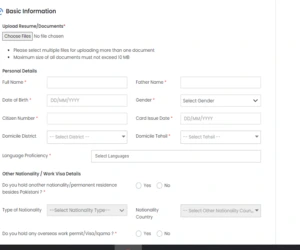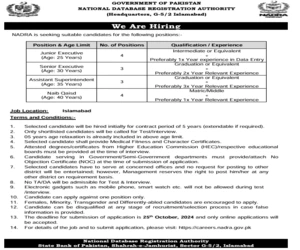Assalam Alaikum friends as you know NADRA has announced new jobs which are advertised in the daily and dawn newspaper dated 12th October 2024 if you are interested in these jobs then you can visit our Full information about these jobs will be given the website, both men and women can apply for these jobs. Interested candidates should provide their necessary documents Eligibility certificates, CNIC and Experience Certificates, recent passport-size photograph and their detailed CV.
Candidates who want to apply for NADRA jobs should read the advertisement given on our website carefully and apply later otherwise your application form may be rejected whatever the requirement from the company. Fulfill them and if you are eligible then you can apply.
Table of Contents
Detail Of Jobs In NADRA 2024
| Post Date | 12-10-2024 |
| Industry | NADRA |
| Jobs Location | Islamabad Pakistan |
| Hiring Organization | NADRA |
| Last Date | 25-10-2024 |
| Education Require | Matric | Intermediate| Graduation |
| No of Posts | 30+ |
| Employment Type | Full Time |
| News Papers | DAWN newspaper |
| Address | NADRA Islamabad, Pakistan |
Eligibility Criteria For Jobs In NADRA 2024
| Education Required | Materic | Intermediate| Graduation |
| Age | 28 to 40 Years |
| Gender | Male| Female |
| Province/District | Karachi Pakistan |
| Experience | 1 years |
Posts Available In Jobs In NADRA 2024
- Junior Executive
- Senior Executive
- Assistant Superintendent
- Naib Qasid
How to Apply For Jobs In NADRA 2024
- Candidates who want to apply in this can apply for only one post.
- All selected candidates will be hired for an initial period of five years, which will be extendable if required.
- Female Minority and Dance Transgender Differentlyable candidates are encouraged to apply for this position.
- Candidates are informed that no electronic gadgets mobile phones and smart watches are allowed during the test.
- The last date for filling out this application form is 25 October 2024.
Apply for Online Jobs In NADRA 2024
The selected candidates will have to apply for the job in the district in which the job is offered because if someone has applied to go to another district, their application form will be rejected.
Those candidates who want to apply online visit our website and study its information if you have any queries about it you can ask us to apply online you need to Go to the NADRA website and apply for the available positions by going to Careers.

Advertisement Of Jobs In NADRA 2024

About NADRA
NADRA (National Database and Registration Authority) is a government agency in Pakistan responsible for maintaining and overseeing the registration of citizens, issuance of identity documents, and managing a centralized database. Established under the National Database and Registration Authority Ordinance of 2000, NADRA plays a crucial role in various aspects of national administration, security, and governance.
1. Core Responsibilities of NADRA
NADRA’s primary function is to maintain an up-to-date database of all Pakistani citizens. It is responsible for issuing several types of identity documents that are used for identification, travel, and other purposes, including:
- CNIC (Computerized National Identity Card): Every Pakistani citizen over the age of 18 must obtain a CNIC. It serves as proof of identity and is necessary for voting, opening bank accounts, obtaining a driving license, and various other civic activities.
- NICOP (National Identity Card for Overseas Pakistanis): This document is issued to Pakistani citizens living abroad. It grants dual nationality rights and allows access to property and bank services in Pakistan.
- POC (Pakistan Origin Card): Issued to foreigners of Pakistani origin, this card allows visa-free entry and stays in Pakistan, as well as the ability to own property and conduct business.
- Smart CNIC (Chip-based CNIC): A more secure, technologically advanced form of the CNIC, containing biometric data and encryption to prevent fraud.
- Family Registration Certificates (FRC): Issued to verify family composition, this certificate lists family members and their relationships.
2. NADRA’s Role in Governance and Security
NADRA’s database is central to a variety of state functions:
- Voter Registration and Electoral Process: NADRA works closely with the Election Commission of Pakistan to register voters. Its comprehensive citizen database is used to generate electoral rolls, ensuring that only legitimate citizens are registered to vote.
- Civil Registration and Vital Statistics (CRVS): NADRA maintains records of births, marriages, and deaths. The authority’s involvement ensures the integrity of these processes by confirming the identities of individuals involved.
- Security and Counter-Terrorism: NADRA’s biometric systems are used by various law enforcement and intelligence agencies to track criminals, verify identities, and combat identity fraud. The integration of its databases into national security systems helps prevent misuse of fake or forged documents.
- Disaster Management: NADRA has played a key role in managing disaster relief efforts. For example, it developed systems to provide financial aid to citizens during natural disasters like the 2010 floods and the COVID-19 pandemic. The data was used to identify and distribute funds to the needy in a transparent manner.
3. Technology and Biometric Systems
NADRA is recognized for its advanced use of technology and biometric systems. Some of its key technological advancements include:
- Automated Biometric Identification System (ABIS): This system enables NADRA to store and match fingerprints, facial recognition data, and other biometrics. The ABIS system is used for identifying individuals, preventing duplication of records, and improving security in the issuance of identity documents.
- e-Government Services: NADRA offers several online services for citizens, such as the ability to apply for CNICs, NICOPs, and POCs online. It also provides SMS services for checking CNIC status and election-related information.
- Data Encryption and Cybersecurity: Given the sensitivity of the data NADRA handles, the authority uses sophisticated encryption techniques and cybersecurity protocols to protect its database from unauthorized access and cyberattacks.
4. Public Service and Economic Impact
NADRA’s services have wide-reaching social and economic implications:
- Financial Inclusion: By providing identity verification, NADRA facilitates access to financial services, especially for underserved populations. This is critical for banking, mobile money services, and welfare programs like the Ehsaas Program.
- Citizen Services and Ease of Doing Business: NADRA’s identity verification services are utilized in various sectors, such as telecommunications, banking, and education. For instance, SIM card registration in Pakistan requires biometric verification through NADRA, ensuring only authorized users can access mobile networks.
5. Challenges Faced by NADRA
While NADRA is globally acknowledged for its efficiency and technological advancement, it also faces challenges:
- Data Privacy Concerns: Given the vast amount of personal and biometric data that NADRA holds, concerns over privacy, misuse of data, and security breaches have been raised. The potential for government surveillance and unauthorized access to citizen information is a subject of debate in civil society.
- Fraud and Corruption: Despite NADRA’s efforts to combat fraud, cases of forged identity documents have surfaced, often due to internal corruption or inefficiencies in the system. Vigilance and system audits are necessary to address these issues.
- Accessibility in Remote Areas: While NADRA operates registration centers across the country, access to these services in remote or conflict-affected regions remains a challenge. Mobile registration units and online services are helping to bridge this gap, but there is still room for improvement.
6. International Recognition and Collaboration
NADRA has gained international recognition for its innovations in identity management. The authority has been involved in providing consultancy and technology solutions to other countries seeking to develop their own citizen registration systems. It has also partnered with international organizations, such as the United Nations, for refugee registration efforts.
7. Future Prospects
Looking forward, NADRA is focusing on further enhancing its digital and biometric systems, including rolling out new services that integrate Artificial Intelligence (AI) and Big Data. The introduction of blockchain for securing data and ensuring transparent record-keeping is also under consideration.
Additionally, NADRA plans to continue expanding its role in governance by offering more e-governance solutions that facilitate public services and citizen engagement with the government. This will likely include improvements in online voter registration, digital signatures, and even blockchain-based voting systems in the future.

